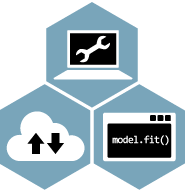Dealing with data can be complicated. There are a lot of pieces to the puzzle, and it’s hard to see the big picture. And while there are many general principles and guidelines that you can follow, each organization has its own unique and highly specific needs. See the cases page for a list of what some typical engagements with me might look like. And see the rates page for a straightforward breakdown of my fees for service.
A common area of data work is migrations. Maybe you still have legacy on-premises applications that you need to migrate to the cloud. I can help with that.
Another common area of data work is integrations. Your organization probably has a lot of data sources, and you’d like to be able to use the data from some of these applications in others. I can help with that, too.
Maybe you have an existing application or data ecosystem, but it’s not performing as well as you had hoped, or performs well but is breaking your budget. I can help optimize your infrastructure for performance and cost.
You might be asking yourself: how does ‘data consulting’ differ from ‘software consulting’ or other types of consulting. There are a lot of software consultants out there, but their focus is usually different from mine. Typical software consultants focus on application development, making sure that an application is developed and maintained in a high-performing way. But they are often not as concerned with the larger picture of an organization’s data, such as data outside the company’s product application, and how application and other data is used downstream (after it leaves the application). Questions like data governance are decidedly outside the realm of practice for most software consultants, who are usually focused more on technical than organizational questions.
That’s where data consulting comes in. I can take a look at the picture of your data across the whole organization and help you find ways to improve your data culture. If you’re not primarily a tech or software company, a lot of software consultants might not concern themselves with your wider data needs. Those often involve questions far beyond application development.
Everyone realizes the importance of analytics, but a lot of managers and executives don’t realize that good analytics depends heavily on a well-designed data infrastructure. Usually it’s not enough to set up Tableau or PowerBI and start getting insight into your data. You’re almost always dealing with a multitude of data sources, some of which aren’t fully connected to each other. It’s common to deal with your organization’s own application data, CRM, HR, payroll and accounting, finance, marketing, and other data sources. I can help build data pipelines that integrate disparate data sources and allow you to get a holistic picture of your business operations from end to end.
Another important area that’s not as often discussed is simulation and modeling. There are a number of techniques (such as agent-based modeling, discrete systems simulation, and system dynamics) and tools (like AnyLogic and Vensim) that are not typically considered under the rubrik of analytics or data science, but which can provide extremely powerful insights into your business. My academic background in Systems Science gives me a solid background in using such alternative methods for understanding how to make your business work better, based on data.
Every organization is different, and it’s important to work with someone who can see the big picture and understand your unique needs. I’m passionate about helping you along that journey. I’ll assess the current state of your data ecosystem, work with you and your employees to put together a plan to make meaningful improvements, and provide the tools and knowledge to make you self-sufficient. I believe in the importance of teaching people to fish, so to speak. I can not only put appropriate systems in place, but train your employees to develop and manage them so that you’ll have a strong data culture for years to come.
 Northwest Data Consulting
Northwest Data Consulting